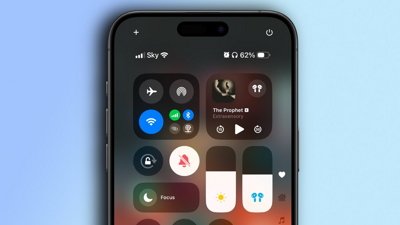If it's true that Apple is aiming for "family-friendly" material across most of its Apple TV+ shows, it may be fighting the streaming video wars with one arm tied behind its back.
Apple certainly made a splash its with its March 25 press event, announcing titles such as "Amazing Stories," "See," and "The Morning Show" — with A-list celebrities like Steven Spielberg, Jason Momoa, and Jennifer Aniston. That was just the tip of the iceberg too, since Apple has many more high-budget projects in the works as a fall launch approaches.
What might be disappointing for some is that there have been multiple reports of Apple wielding a heavy hand in content, insisting that creators stay within certain bounds when it comes to sex and violence. Even CEO Tim Cook has become involved, despite no experience in film or TV, supposedly writing things like "don't be so mean!" in notes.
The company is additionally said to be putting the kibosh on storylines that criticize technology, so there'll be no equivalent of "Black Mirror," regardless of the artistic views of writers and directors.
We're not sure how this jives with Apple's stated intention of being at "the intersection of technology and the liberal arts." That's nothing new, though — developers have long complained about Apple's content restrictions on the App Store, where apps meant to highlight possible war crimes have been banned for being "excessively objectionable or crude."
Read the room
Apple is a private U.S. company, and can reject just about any content it wants to as a result. It may be tone-deaf when it comes to popular media tastes however, which makes a business case for stronger freedom of expression.
The obvious reference point is HBO's "Game of Thrones," now in its final season. The show sometimes features graphic sex and violence, enough that even fans can be disgusted. Yet it's arguably the most popular TV show in the world, a huge moneymaker with tons of merchandise, cultural landmarks, and upcoming spinoffs. Other "mean" shows are institutions too — "The Walking Dead" for instance, and yes, "Black Mirror."
You don't need to go blue to be profitable. After all, some of the biggest shows in history have been clean, such as "Friends" and "The Big Bang Theory." Beyond Netflix, Apple TV+'s closest competition is likely to be Disney+, debuting Nov. 12 with (mostly) family-friendly material from studios like Marvel, Pixar, Lucasfilm, and National Geographic.
Turn your head though to the most popular shows on IMDb and Rotten Tomatoes right now. Many of them would be impossible under Apple's current rules.
That's also true when you focus on specific streaming services. Hulu's best-known show is probably "The Handmaid's Tale," based on the Margaret Atwood novel — but it would probably run afoul of Apple for criticizing Christian fundamentalism, never mind other issues. One of Netflix's latest hits is "Santa Clarita Diet," a horror comedy about eating human flesh.
Apple's policies simply fly in the face of broader trends in the TV industry, which is a problem when you're asking people to pay a monthly fee. That goes doubly so if you're anchoring your hopes on original rather than third-party video.
Disney+ could be a counterexample, but that will launch with a decades-long library for just $6.99 per month or $69.99 per year. In fact rather than competing with Apple TV+ directly, many people will combine it with Netflix, Hulu, or Amazon Prime Video and shut Apple out of the loop. Apple will have its share of subscribers just based on the devout buying in early — but the real question is whether it'll become a leader.
Who's in and who's out?
In the long term, Apple may face the issue of recruiting talent with profound content limitations. The best artists normally prefer partners with the most creative freedom — the company lost a project by "Roma" and "Gravity" director Alfonso Cuaron for that very reason.
Given the firmly established platforms available elsewhere, if Apple keeps a tight grip on the creative reins, mercenary stars will stay for the money, but creative-oriented ones may look elsewhere. Apple will keep spending billions to retain and recruit talent, but for every Spielberg or Abrams it recruits, it will be losing a Cuaron, David Fincher, or Guillermo del Toro.
With hundreds of billions in its coffers, Apple will make or call Apple TV+ a success one way or another. It can afford to wait for traction, like it did for the Apple Watch. It's just a matter of how long it will take, and what Apple will sacrifice in regards to ethos to do so.
 Roger Fingas
Roger Fingas














 Amber Neely
Amber Neely
 Charles Martin
Charles Martin

 Sponsored Content
Sponsored Content
 AppleInsider Staff
AppleInsider Staff
 Malcolm Owen
Malcolm Owen
 Oliver Haslam
Oliver Haslam
 Andrew O'Hara
Andrew O'Hara








39 Comments
Not to get into a debate on virtues, but let’s all read that title again and think about it for a few minutes. 😉
I bet the pictures and videos people shoot on their iPhones reflects the full gamut of iLife. Apple should ask itself, who are we trying to shield? And from what?
The “don’t be so mean” directive by Cook, if he really has issued that directive on one or more occasions, might be appropriate, but it’s not exactly a standard that should be applied universally, nor is it even well enough defined where the meanness line should be drawn.
I’d support a set of standards Apple, or any content producer, might draw up, but they should be standards that limit only needless excessive license.
Don’t be excessively mean if it’s not necessary to convey the story.
Don’t be excessively pornographic if not necessary.
Don’t appeal to baser instincts just to sell a story.
Don’t lie or embellish when portraying factual events.
I used to tell my employees, “our job, beyond anything we produce, is to conduct our business in a manner that allows us to afford both our rent and our principals. Don’t compromise your principals in pursuit of even the most desirable of outcomes.”
Such directives don’t restrict artistic license, just excessive license. I’m thinking of the 2015 Steve Jobs movie; I’d attempt to establish standards that would prevent that mess from turning out the way it did.
I am so tired of the God money. The profits arguments beating everything..... This article comes out the next day that this one other shows up: www.usatoday.com/story/life/tv/2019/04/29/study-kids-suicides-spiked-after-netflixs-13-reasons-why/3623872002/ That GOT is making so much money is not saying anything about the damage that it makes to society. The number of articles that says how much TV influences society are more than enough. Otherwise, why do companies invest so much in advertisement? Or do you still believe the argument that advertisement are "only" to inform?
I support Apple's intent/desire to stay 'family safe'.